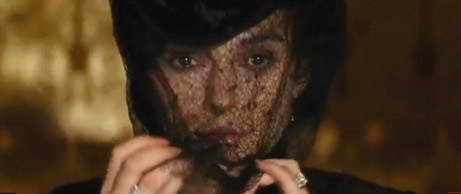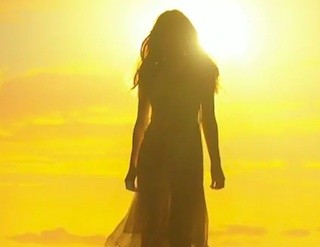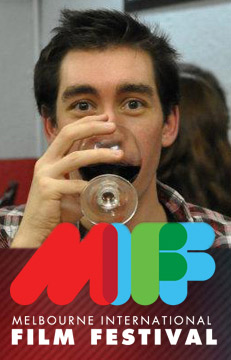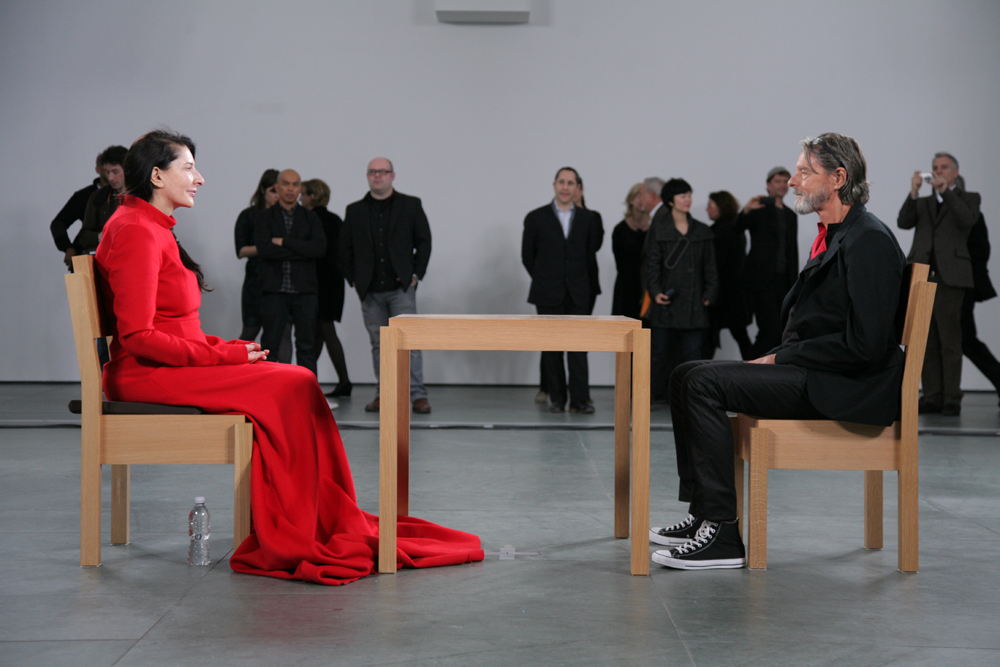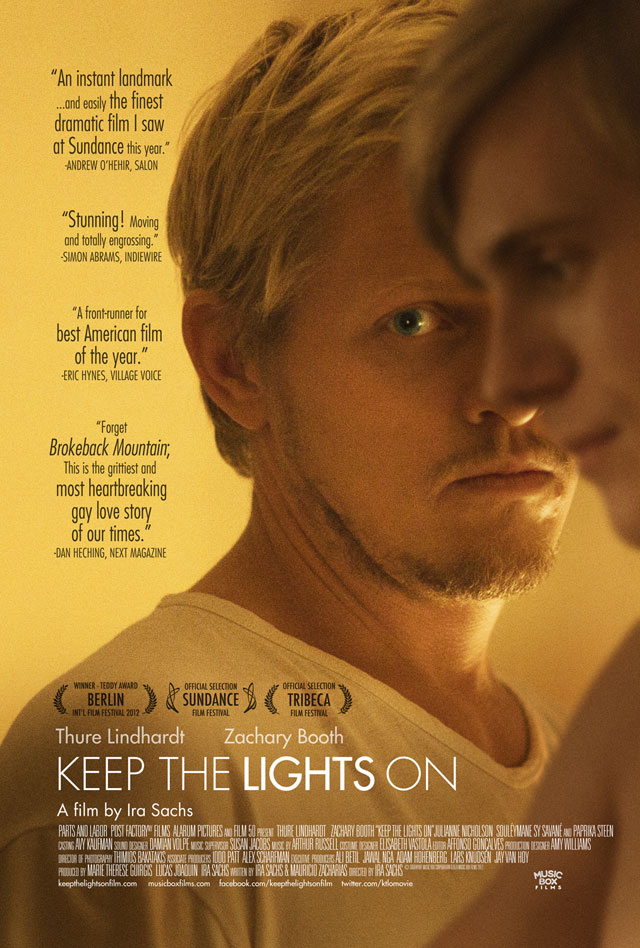 Glenn here winding down with the Melbourne Film Festival coverage. For whatever reason, MIFF’s selection of queer films is never particularly large. I wasn’t able to attend the AIDS documentary How to Survive a Plague, although I’ve heard it’s a powerful experience, but I did get along to Ira Sachs’ Keep the Lights On that follows a nine-year relationship between a Danish documentary filmmaker (Thure Lindhardt, Into the Wild) and a lawyer (Zachary Booth, Damages, Dark Horse) in New York City. I know Nathaniel’s not a fan (and I can certainly see why as there are problematic areas), but it’s rare for a “gay film” to find a positive foothold in the critical community so that made it a veritable must see.
Glenn here winding down with the Melbourne Film Festival coverage. For whatever reason, MIFF’s selection of queer films is never particularly large. I wasn’t able to attend the AIDS documentary How to Survive a Plague, although I’ve heard it’s a powerful experience, but I did get along to Ira Sachs’ Keep the Lights On that follows a nine-year relationship between a Danish documentary filmmaker (Thure Lindhardt, Into the Wild) and a lawyer (Zachary Booth, Damages, Dark Horse) in New York City. I know Nathaniel’s not a fan (and I can certainly see why as there are problematic areas), but it’s rare for a “gay film” to find a positive foothold in the critical community so that made it a veritable must see.
There’s a moment when Lindhardt’s Erik passes a graffiti sign that reads “FAKE YOUR BEAUTY”, which is actually a good motto for Keep the Lights On. Sachs has certainly made his film look very nice, a professionalism that is sadly lacking from much gay cinema, but it doesn’t quite cover up the fact that the movie doesn’t have anything particularly new to say – in the end it’s still a domestic drama about two people torn apart by tragedy. The actors, especially Lindhardt walking a tightrope of fey, are wonderful and Sachs has imbued the visuals with a warm New York glow without ever resorting to travelogue sightseeing imagery. The song score by Arthur Russell could nauseate some, but I found the dizzying crooning to be lovely. Meanwhile, the gay sex scenes are refreshingly realistic and open, plus the screenplay by Sachs and Mauricio Zacharias thankfully avoids preachy grandstanding about Gay Issues (although an out-of-nowhere AIDS scare is on the nose).
On the flip side… the film is, from my limited readings, based on his own experiences and he has obviously slanted the film in his favour. Lindhardt, as his own stand in, plays a documentarian who wins the prestigious Teddy Award at the Berlin Film Festival… was that his own form of intellectual bribery? Keep the Lights On eventually went on to win the same prize earlier this year. Hmmm. Elsewhere, Booth sadly gets too little to do in spite of his characters downward spiral. Likewise, Paprika Steen (we love her!) is underused as Erik’s sister and feels like a superfluous plot strand that the director didn’t know how to fully utilise.
It’s certainly no Weekend, or even Brotherhood (a Danish gay drama that also starred Lindhardt), but I did find much to like about this film. It arguably should have ended some ten minutes earlier – a trend of any film festival, surely, are independent productions that should have ended ten minutes earlier – and finished on a more ambiguous note, but it does enough interesting work with the clichés of gay life to make it a rewarding watch. (B)
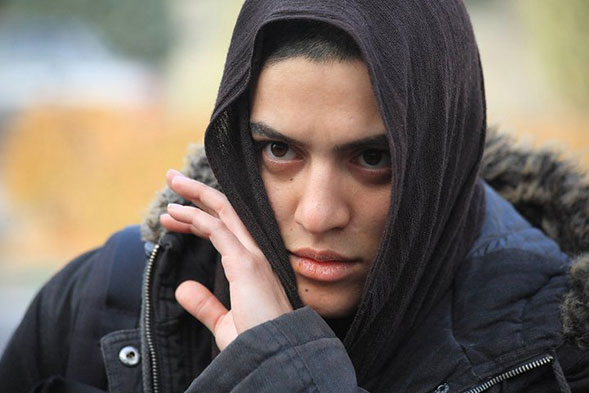
A conservative Iranian taxi driver whose husband is in jail accepts a fare from a woman she finds on the roadside who’s desperate to flee an arranged marriage. What makes Negar Azarbayjani’s delicate Facing Mirrors so interesting is that the cab passenger is actually a pre-op transsexual. It’s a road trip as unconventional as (to be entirely reductive about it) Transamerica, but… well, you know, better. Unburdened by that American film’s stunt casting of a celebrity, Azarbayjani’s film is able to lend both characters depth and genuine worries of the heart and brain without busying the viewer with “Wow! Look at the transformation! Wow!” style thoughts.
The screenplay by Azarbayjani and Fereshteh Taepoor eventually gets bogged down in the preachy “aren’t we all the same?” semantics that I just praised Keep the Lights On for avoiding. Subtlety is hardly this film’s strong suit. However, there’s still a thrill in seeing Iranian filmmakers take on prickly subjects, and the performance of Shayesteh Irani (the incredible Offside) is a powerful one. (B-)
By far the best of the gay cinema on offer was Aurora Guerrero’s Mosquita y Mari. Traipsing the familiar coming-of-age-while-coming-out path of many before it (like other excellent recent ethnic-centric examples Pariah and Circumstance), this sublime teen drama set amongst an American immigrant community has such an authentic, illuminating quality to it that it proved to be one of my highlights of the entire festival. Starring Fenessa Pineda as a bright young student whose parents see education as a way out of menial labour and Venecia Troncoso as her rebellious, new-girl-in-town friend, Mosquita y Mari is perhaps the finest examinations of real world teenagers I’ve seen since Gus Van Sant’s Paranoid Park.
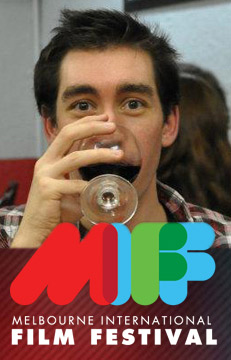 Guerrero immediately instils her film with a dazzling sense of place. The sun-drenched surrounds of the Huntington Park area is so lovingly lit that you can feel the sweaty brow of the Californian sun permeate through the screen. The cinematography by Magela Crosignani grabbed me with its constant hazy oasis of a far-off big city promising a better life, as well as the purple and orange sunsets that belie its modest budget (this is just one of many films I noticed end credits for thanking Kickstarter, Pozible, and other fundraising schemes). The music choices, too, are fabulous and mirror the ever-expanding horizons of its core characters. Initially peppering the soundtrack with the stereotypical twang of a guitar and the stroke of a mournful piano, the music eventually encompasses jungle trance, hip-hop, Latin, and synth pop. Just one of the many smart moves by this first-time director. As the screenplay tackles identity within a community that struggles with it, the actors – especially the two leads (hey, they actually look like kids!) – really sell the confusion, elation, flirtation and disappointment. This is an impressive, sweet and sincere gem of a film. (A- / B+)
Guerrero immediately instils her film with a dazzling sense of place. The sun-drenched surrounds of the Huntington Park area is so lovingly lit that you can feel the sweaty brow of the Californian sun permeate through the screen. The cinematography by Magela Crosignani grabbed me with its constant hazy oasis of a far-off big city promising a better life, as well as the purple and orange sunsets that belie its modest budget (this is just one of many films I noticed end credits for thanking Kickstarter, Pozible, and other fundraising schemes). The music choices, too, are fabulous and mirror the ever-expanding horizons of its core characters. Initially peppering the soundtrack with the stereotypical twang of a guitar and the stroke of a mournful piano, the music eventually encompasses jungle trance, hip-hop, Latin, and synth pop. Just one of the many smart moves by this first-time director. As the screenplay tackles identity within a community that struggles with it, the actors – especially the two leads (hey, they actually look like kids!) – really sell the confusion, elation, flirtation and disappointment. This is an impressive, sweet and sincere gem of a film. (A- / B+)
 Sunday, September 9, 2012 at 3:00PM
Sunday, September 9, 2012 at 3:00PM 
